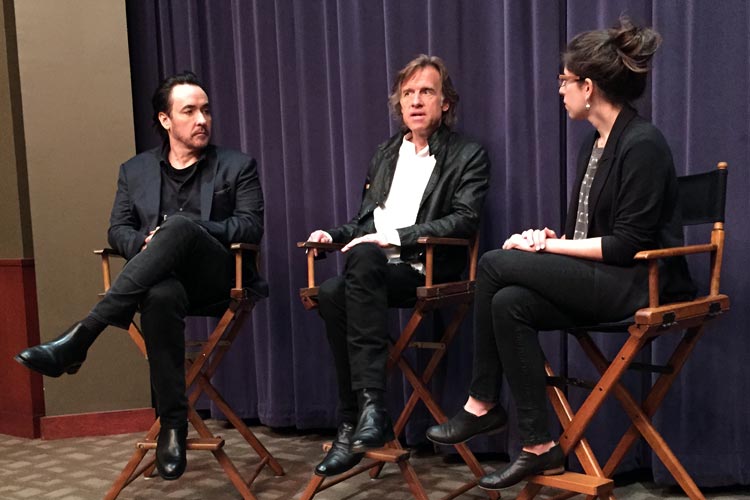The following questions and answers are excerpted from a conversation that followed the NBR screening of Love & Mercy.
Can you discuss casting the two versions of Brian Wilson?
Bill Pohlad: Casting the Brian-future role was a little more complicated than the Brian-past, actually. Brian went through not only so many physical changes, but also so many mental changes, particularly in the ’80’s. For instance, if you do a search for “Brian Wilson 1980’s,” you get a lot of different pictures, a lot of different looks. And so we really had to decide which physical representation of Brian were we going to try to portray. Honestly, we were kind of struggling with it. And I went back and watched a documentary that Don Was did back in the early ’90’s called I Just Wasn’t Made for These Times, and early on there’s a scene of Brian just sitting and talking and in that particular moment there was something about his look that made John pop into my mind.
John Cusack: And in that period of his life, he was sort of the Howard Hughes of rock ’n’ roll. He was the genius who went silent—it’s hard to tell where the facts end and the legend begins with Brian. But Melinda sent us a picture of him from the ‘80’s, and she really helped ground his character in reality. But the point was never to do any kind of strict imitation of Brian between myself and Paul Dano. The intention was to have two separate actors with two different interpretations of Brian that would harmonize somehow. But there had to be a leap of faith there. Thankfully we always had his music to go back to.
“He was sort of the Howard Hughes of rock ’n’ roll”
How did you prepare the role? Did you speak with Brian at all?
JC: I did—you know, I didn’t want to be the guest who wouldn’t go away, but it was definitely important to me to spend time with him. I had to, because the part of his life I portray is such a mystery; there was really no other way to understand it. Brian and Melinda were so gracious to let me hang out with them, to let me talk with them, and I also got a lot of insight from Gloria, their long time housekeeper.
The score of the film is fascinating. How did you approach it?
BP: There were two elements for me, when we started looking for composers. Just as important as the actual music was the sort of “mind trips” we wanted to go on, the parts of the film where we wanted to go into Brian’s head and give the audience a sense of what he actually hears. His condition causes him to have hallucinations, but they’re auditory hallucinations, not visual hallucinations. So I really wanted to explore that, and for some reason — after talking to Brian and to other people who have experience with this kind of condition so that I could get an idea of what he’s actually hearing — the one thing that kind of came into my mind was “Revolution 9” off The Beatles White Album as the template, basically, for something like that. And of course there were a lot of people who wanted to be involved in the score and the sound design, since it’s Brian Wilson! But you don’t want someone to come in and compete with Brian’s music. And one of the first people I sat down with was Atticus Ross. And because of his background in producing, and his own talent as well, he immediately got on board with the “mind trips” idea. It was actually Atticus who started pushing the idea of taking the original session tapes and essentially pulling them apart and taking strands and reformatting and putting them back together in different ways to suggest the creative process of actually making the music. And that creates the score. So 85-90% of what you hear is actually Brian’s music.
How did you work with your co-stars?
JC: I didn’t work with Paul Giamatti too much, because it was just too horrible for us to think about! I would just get a drink with him after work, that sort of thing — I just felt like he was so repulsed by playing Landy that it was almost making him sick. And the stuff with Elizabeth was very easy because casting her as Melinda was such a good decision. It was such a good fit. When you meet Melinda, you realize her and Elizabeth are so similar: they’re both these fierce, fantastic dames in the best possible way. Elizabeth and I talked about the fact that because of the necessary economy of making a movie like this, when you show the abusive relationships Brian was in (both his therapist and his father), there has to be within that somewhere a flame of Brian Wilson that’s so mischievous and playful that they would fall in love. But the way film works, the opportunities to show that on screen are very few. So Elizabeth had a very hard job because she had to navigate through this very damaged person to find that small flame that would cause her to fall in love with him. It was a difficult and delicate thing to navigate, because Landy didn’t give them any time alone! They had to literally jump off a boat to get away from him for a few minutes.

